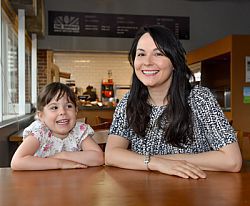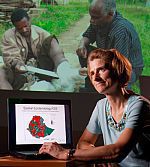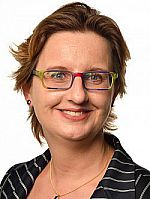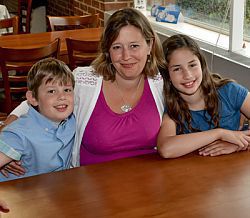Career profiles
- Professor Sam Cartwright-Hatton, Professor of Clinical Child Psychology
-
 I'm an academic clinical psychologist, specialising in researching and developing psychological interventions for children's emotional disorders.
I'm an academic clinical psychologist, specialising in researching and developing psychological interventions for children's emotional disorders. I started my career with a PhD in Oxford, where I met James: engineer, feminist, and trailing-spouse. In 1999, I moved to Manchester to complete my clinical training, and James upped-sticks from The South (brave) and came with me. We stayed there for 11 years, during which time I progressed up the ranks at the University of Manchester, James started his own business, and, in 2010, we had a daughter, Georgie.
Part of my research concerns the impact of early life parenting experiences, so I was determined that we were going to get this bit as right as we could, and I took 12 months’ maternity leave, even though doing so meant winding my career down to almost nothing before I left.
Shortly after giving birth to Georgie, I was awarded an NIHR fellowship. It offered me a generous salary, for three days a week, and was going to allow me to do some research that I was burning to do, and which desperately needed doing. The only fly in the ointment was that it was based at the University of Sussex ... and we would have to move.
By this point, James's business was doing very well, employing lots of local staff ... there was just no way he could move it. So, me and Georgie moved full time, and poor James split his time between the two places. It's been hard at times – on all of us, but we are all sure that it was the right thing to do. In the past year, James's business was bought by another company in the South East, and although he still spends a lot of time away, life has got easier.
Working part time has been harder than I thought. It has taken me a long time to work out what I can realistically achieve in three days (especially when those days must finish at 5.15pm, unless I want to get home to a mutinous nanny ...), but I'm getting there. In other ways, I'm fortunate: I research parents, and becoming one has deepened and nuanced my understanding of what it is to be a parent, and of the impact that parents can have on children.
- Professor Gail Davey, Professor of Global Health Epidemiology
-
 While living in Ethiopia, I became interested in podoconiosis, a tropical form of leg swelling (elephantiasis). Although I have a medical background and epidemiology training, one of the great joys of working on ‘podo’ has been the chance to collaborate with scientists from a huge range of disciplines – including geologists, ethicists, geneticists and social scientists. The other thing I love about my research is that there is still so much to do, both in terms of solving the puzzle of the cause of disease, and getting prevention and treatment to the communities that need it.
While living in Ethiopia, I became interested in podoconiosis, a tropical form of leg swelling (elephantiasis). Although I have a medical background and epidemiology training, one of the great joys of working on ‘podo’ has been the chance to collaborate with scientists from a huge range of disciplines – including geologists, ethicists, geneticists and social scientists. The other thing I love about my research is that there is still so much to do, both in terms of solving the puzzle of the cause of disease, and getting prevention and treatment to the communities that need it.My husband, Richard, and I waited till after his career as an international distance runner had finished before we had children. By this stage I had finished my doctorate and was a Clinical Lecturer. So in 2001, I gave birth to our daughter Almi and we moved to Ethiopia a few months later – I took up an unsalaried Assistant Professor position at Addis Ababa University. This was a brilliant move in terms of flexible working, good childcare and low cost of living. Lukas was born in late 2003 and again I had great support when returning to work after his birth.
With the help of collaborators in the UK (particularly Melanie Newport at BSMS), I began to get grants to study podoconiosis, and started working with a long stream of talented Ethiopian research students.
We moved back to the UK in 2010 and I joined BSMS as a Reader in Global Health. The podo work keeps expanding, and now has a direct impact on patient care. I was promoted to a Chair in 2013, and both Richard and I juggle overseas travel with looking after Almi and Lukas.
- Professor Kathy Romer, Professor of Astrophysics
-
 Kathy got her PhD in Edinburgh in 1995. She then spent nine years in the USA as a postdoc and junior faculty member. She returned to the UK in 2004 and has been at the University of Sussex, as part of the Sussex Astronomy Centre, ever since.
Kathy got her PhD in Edinburgh in 1995. She then spent nine years in the USA as a postdoc and junior faculty member. She returned to the UK in 2004 and has been at the University of Sussex, as part of the Sussex Astronomy Centre, ever since.She works in the field of observational cosmology, with a particular specialism in the area of X-ray clusters of galaxies. She makes regular use of many of the premier telescopes around the world, and in space. She leads the XMM Cluster Survey collaboration and the X-ray efforts related to the international Dark Energy Survey project.
In addition to her research, she teaches Astronomy and Physics at undergraduate and postgraduate level, and has many local, national, and international, administrative roles. Her responsibilities in the Physics and Astronomy department include chairing the Physics Athena SWAN committee and enhancing career outcomes for undergraduate and postgraduate students.
She also enjoys performing stand up comedy and being Mum to two sports-mad sons.
- Professor Louise Serpell, Professor of Biochemistry
-
 I am a structural biologist with a strong interest in protein misfolding, which occurs in diseases such as Alzheimer's and Parkinson's disease.
I am a structural biologist with a strong interest in protein misfolding, which occurs in diseases such as Alzheimer's and Parkinson's disease.I surprised my parents by announcing at the age of 9 that I wanted to be a scientist and was further enthused as a teenager by reading The Double Helix about the determination of the structure of DNA by Watson and Crick. This drove me to pursue a degree in Biochemistry and Genetics at Nottingham University and then onto Oxford for a PhD to study the structure of fibrous proteins involved in Alzheimer's disease, using the exact same techniques used by Rosalind Franklin* to decipher the DNA structure.
A chance meeting at a conference led to me moving to Toronto, Canada for 18 months to do a postdoc to further investigate Alzheimer's proteins. I missed home and my husband-to-be and so I jumped at an offer to take up an independent position at the Laboratory of Molecular Biology in Cambridge.
After nearly two years’ long-distance relationship, we both found jobs in Cambridge and remained there for six years. During this time, I was delighted to be awarded a Wellcome Trust fellowship and I moved my lab to a building next door to and under the umbrella of the University of Cambridge. After holding the fellowship for two years, I had my daughter. It turns out that this was perfect timing. I was able to run my lab whilst away on maternity leave and had the independence that seemed necessary to plan my own time.
A year later, we moved to Brighton, where my husband took up a permanent job within the MRC Genome Damage and Stability Centre at the University of Sussex. I moved my fellowship and had my son, again, lucky to have the independence to allow me to plan my time. For each of my children, I had four months off … so, I say I was lucky. I was independent, I could plan my time, but I needed to get back to work to follow my career path. This was a difficult time. Leaving my tiny children at nursery was painful, and I battled with the guilt of leaving them and also not being able to work hard enough due to my family commitments. However, I managed to secure a permanent job at Sussex after a few years and was promoted to Reader and then, to Professor.
One of the most fulfilling parts of my job has been working with amazing people. My students and postdocs have made outstanding contributions to our work, and I could not have gained this post without them.
This apparently smooth path had its trials. When my son was 10 days old, I had to attend an interview for an MRC senior fellowship. Not surprisingly, given my recovery from C-section and having had to bring my son and feed him 10 minutes before the interview, I was unsuccessful. I attended a second interview, this time for a Wellcome fellowship, when he was just three months old (my daughter helped by having chicken pox that week!). Again, I was unsuccessful.
During my career, I have doubted my abilities often. I have suffered from the fear of being "found out", which I now realise is a common feeling known as "imposter syndrome". I still suffer from guilt when my son asks for help with something and I say, "Just wait until I have replied to this email". I think that we suffer for our career; I hope my children haven't suffered too much. They have a full-time working mum, but I try to make the time I spend with them special and to do exciting, fun things that we all enjoy. They also help me to put things into much-needed perspective.
* Biophysicist whose work on the X-ray diffraction images of DNA led to the discovery of the DNA double helix by Francis Crick and James Watson in 1953.

